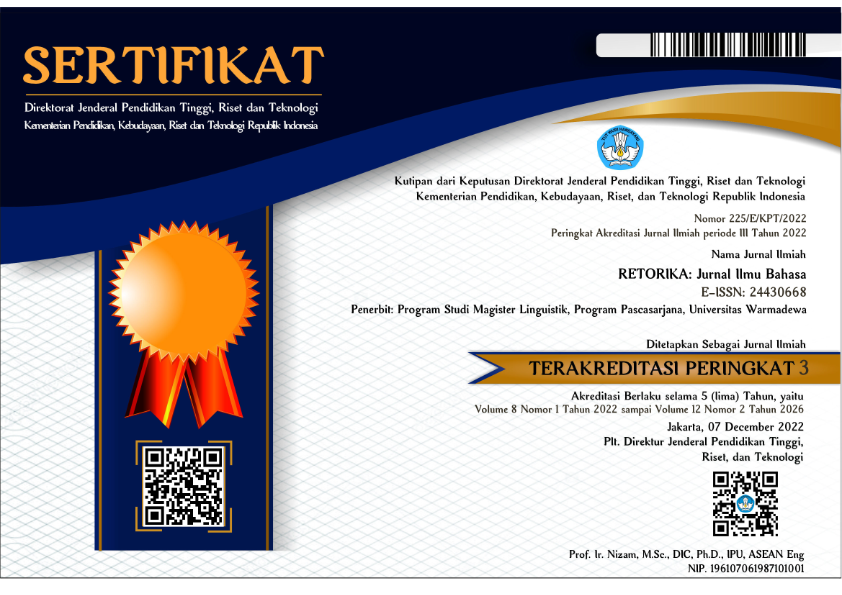SEEING RECOUNT FROM SYSTEMIC FUNCTIONAL LINGUISTIC PERSPECTIVE: SINE QUA NON ATTRIBUTES
Abstract
It is believed that traditional grammar is no longer appropriate to teach students especially in developing their writing skill. Systemic Functional Linguistic (SFL) which focuses on meaning and function behind language is now seen to be well-implemented. The study tried to analyse student’s piece of writing on one type of text in which Hotel Industry students as the sample of the study should master known as recount text. Purposive type of sampling was chosen since there was only one text analysed which was seen as the most problematic one. Content analysis as the implementation of qualitative research was chosen as the design of the study. The findings showed that the major problem student encountered mostly on grammatical structures in which there were found some errors on it. Regarding the three metafunctions, it was known that the students had been able to accomplish all criteria of recount text, such as using mostly material processes which deals with ideational metafunction, using correct tense and subject to fulfil the mood exists in interpersonal metafunction, and using reiteration and zigzag pattern as representation of textual metafunction. However, since there was problem to overcome, a strategy was proposed known as “POWER†which stands for Plan, Organise, Write, Edit, and Revise, which is hoped to help students developed a well-constructed text fulfilling all sine qua non attributes that recount text has.References
Agustien, H. I. R. (2004). Setting Up New Standards: A Preview of Indonesia’s New Competence-Based Curriculum. TEFLIN Journal: A Publication on the Teaching and Learning of English, 15(1), 1–13. Retrieved from http://www.journal.teflin.org/index.php/teflin/article/view/78
Alwasilah, A. C., & Alwasilah, S. S. (2005). Pokoknya Menulis. Bandung. Bandung: PT Kiblat Utama Buku.
Derewianka, B. (1990). Exploring how texts work. Heinemann Educational Books.
Derewianka, B. (1992). A functional model of language. North Sydney. Board of Studies.
Eggins, S. (1994). Linguistics, An introduction to systemic functional. In London. Pinter Publishers.
Emilia, E. (2005). A critical genre based approach to teaching academic writing in a tertiary EFL context in Indonesia. The University of Melbourne.
Englert, C. S., Raphael, T. E., Anderson Helene M. Anthony, L. M., & Stevens, D. D. (1991). No TitleMaking strategies and self-talk visible: Writing instruction in regular and special education classrooms. American Educational Research Journal, 28(2), 337–372.
Englert, C.S., Raphael, T.E., Anderson, L.M., Anthony, H.M., Fear, K.L., & Gregg, S. . (1988). A case for writing intervention: Strategies for writing informational text. Learning Disabilities Focus, 3(2), 98–113.
Gerot, L. & Wignel, P. (1995). Making sense of functional grammar. In Sydney. Antipodean Educational Enterprises.
Halliday, M. A. K. (1976). System and function in language (Edited by Kress, G. London. Oxford University Press.
Halliday, M. A. K., & Matthiessen, C. M. I. . (1994). An Introduction to Functional Grammar. An introduction to functional grammar. https://doi.org/10.4324/9780203431269
Knapp, P., & Watkins, M. (2005). Genre, text, grammar: Technologies for teaching and assessing writing. UNSW Press.
Malik, R. S., & Hamied, F. A. (2014). Research methods: A guide for first time researchers.
Neuman, L. W. (2002). Social research methods: Qualitative and quantitative approaches.
Nurohmah, I. (2013). An analysis of students’ recount text by using systemic functional grammar. Electronic Journal of Indonesia University of Education : Passage, 1(2), 89–98.
Palmer, S. (2011). How to teach writing accross the curriculum (2nd Ed.). In London. Routledge Taylor & Francis Group.
Senjawati, D. (2016). Transitivity Analysis of Tenth Grade Students ’. Journal of English and Education, 4(1), 1–22.
Thompson, G. (2007). Introducing functional grammar. Language (Vol. 83). Edward Arnold. https://doi.org/10.1353/lan.2007.0073
Yunita, S. (2016). THEMATIC PROGRESSION IN STUDENTS’ RECOUNT TEXTS. Educational Sciences: Jurnal Ilmi Pendidikan Bahasa Inggris, 1(3), 50–59.
Copyright (c) 2018 RETORIKA: Jurnal Ilmu Bahasa

This work is licensed under a Creative Commons Attribution-ShareAlike 4.0 International License.
This journal provides immediate open access to its content on the principle that making research freely available to the public supports a greater global exchange of knowledge.
All articles published Open Access will be immediately and permanently free for everyone to read and download. We are continuously working with our author communities to select the best choice of license options, currently being defined for this journal as follows: Creative Commons-Non Ceomercial-Attribution-ShareAlike (CC BY-NC-SA)
 Abstract viewed = 474 times
Abstract viewed = 474 times
 PDF downloaded = 436 times
PDF downloaded = 436 times

2.png)














